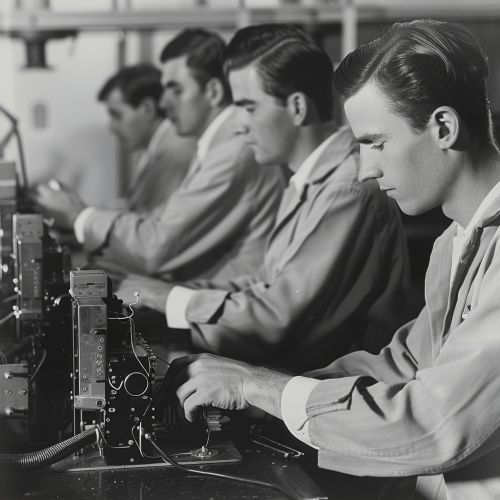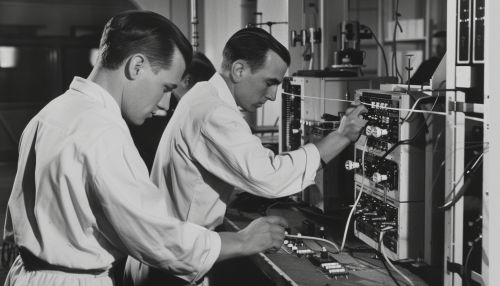History of the transistor
Introduction
The transistor is a fundamental component in modern electronics, serving as the building block for a wide array of devices, from computers to communication systems. This article delves into the history of the transistor, tracing its development from early theoretical concepts to its current state as a ubiquitous element in technology.
Early Theoretical Foundations
The origins of the transistor can be traced back to the early 20th century, with the development of quantum mechanics and the understanding of semiconductors. The photoelectric effect and the work of Albert Einstein laid the groundwork for understanding electron behavior in materials. The discovery of the electron by J.J. Thomson in 1897 also played a crucial role in the development of semiconductor theory.
The Birth of Semiconductor Technology
In the 1920s and 1930s, scientists began to explore the properties of semiconductors more deeply. Julius Edgar Lilienfeld filed a patent for a device similar to a field-effect transistor (FET) in 1925, although it was never built. Walter H. Brattain, John Bardeen, and William Shockley at Bell Labs conducted extensive research on semiconductors, leading to the invention of the first practical transistor.
The Invention of the Transistor
On December 16, 1947, John Bardeen and Walter Brattain successfully demonstrated the first point-contact transistor. This breakthrough was followed by William Shockley's invention of the bipolar junction transistor (BJT) in 1948. These inventions marked the beginning of the transistor era, revolutionizing electronics by providing a more reliable and efficient alternative to vacuum tubes.


Development and Commercialization
The 1950s saw rapid advancements in transistor technology. The development of the planar process by Jean Hoerni and the integrated circuit by Jack Kilby and Robert Noyce paved the way for mass production and miniaturization of electronic components. Transistors began to replace vacuum tubes in a variety of applications, including computers, radios, and television.
The Rise of Silicon Transistors
Initially, transistors were made from germanium, but silicon soon became the material of choice due to its superior electrical properties and abundance. The development of silicon transistors was spearheaded by companies like Fairchild Semiconductor and Texas Instruments. Silicon transistors offered better performance, reliability, and cost-effectiveness, leading to their widespread adoption.
Impact on Computing and Electronics
The transistor's impact on computing cannot be overstated. The invention of the microprocessor in the 1970s, which integrated thousands of transistors onto a single chip, revolutionized the computer industry. This led to the development of personal computers, mobile phones, and other digital devices that have become integral to modern life.
Advances in Transistor Technology
Since the invention of the first transistor, there have been numerous advancements in transistor technology. The development of the metal-oxide-semiconductor field-effect transistor (MOSFET) in the 1960s enabled further miniaturization and increased performance. Innovations such as FinFET and carbon nanotube transistors are pushing the boundaries of what is possible in semiconductor technology.
Modern Applications and Future Directions
Today, transistors are used in virtually every electronic device. They are essential components in digital circuits, analog circuits, and power electronics. Research continues to explore new materials and designs, such as graphene transistors and quantum transistors, which hold the promise of even greater performance and efficiency.
Conclusion
The history of the transistor is a testament to human ingenuity and the relentless pursuit of technological advancement. From its early theoretical foundations to its current role as a cornerstone of modern electronics, the transistor has transformed the world in profound ways.
